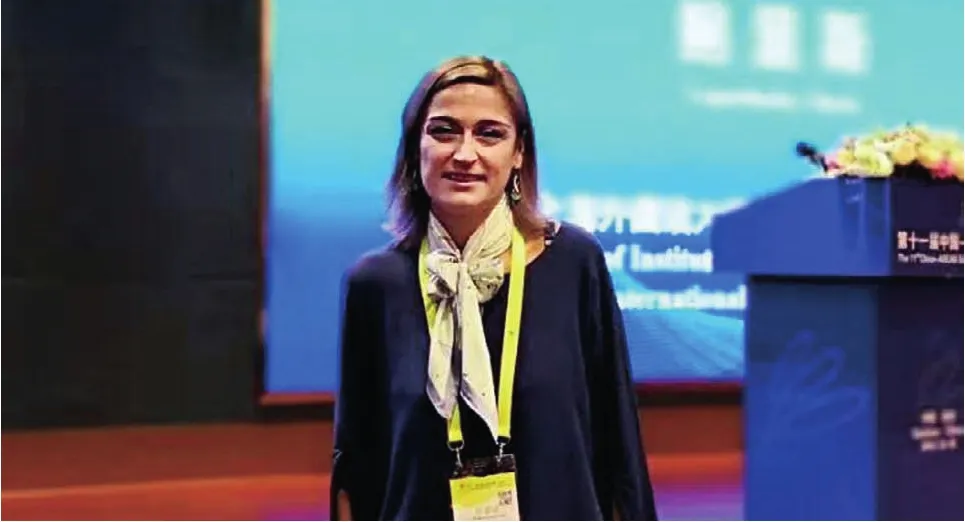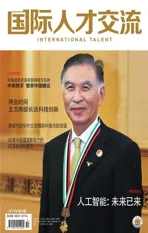无处不在的文化差异
2019-05-06LyubaAtanasova谢惠君
文/Lyuba Atanasova 译/谢惠君
中西方文化差异其实是广泛存在于不同领域的——比如每天的生活习惯、信仰、道德观、饮食文化等。而我自然会选择我所擅长的领域来谈一谈,就是家庭教育和学术教育上的中西方文化差异。
中国人的生活是以家庭为中心、以家庭价值观为主导的。对他们来说,这种关系(甚至是依赖关系)是极其强大的。我经常跟那些为了顺从父母心意而放弃自己个人选择和目标的学生提到这一点。
这种关系在西方文化中却很难让人理解。自由主义和以自我为中心的观点从脆弱的童年就逐渐形成并愈加明显,并且孩子从小就被激励要支配自己的事,甚至是成人的事。
根据我对中国学生行为的观察,我了解到他们与欧洲学生大有不同,以下列举的几点,是我在北京外国语大学六年的教学实践中得到的:
中国学生非常害羞。他们不喜欢强调自己的优势。集体主义对他们来说很重要。而欧洲学生则认为自己非常特别、独一无二。所以他们不仅喜欢展示自己,也喜欢表明自己的观点和个性。
在上课或者练习时,中国学生即使不明白,也不会打断老师。然而,我认为这是很重要的学习方法,也是我的教学手段之一,所以我一早就告诉他们,如果有不明白的地方,必须马上打断我并提问。在熟悉我的教学方式以后的第三年,才出现了中国学生打断我的场景(而且也只是部分学生这样做)。而欧洲学生则习惯在任何情况下打断教授的讲课。
中国学生不习惯表达自己个人的意见,即使是针对那些有争议的话题。相反,欧洲学生则乐于这样做,即使没有人要求他们这样做,他们也乐意表达自己的观点,甚至试图将自己的观点强加于别人。
中国学生尊师重教。他们以尊重的态度对待教师,如果他们喜欢某位老师,甚至会对他充满爱慕和崇敬。可惜的是,可能是因为受到欧洲自由式教育的影响,于我而言,老师并非是不可挑战的权威。日渐形成的对教育的怀疑就更不用说了。
中国学生喜欢重复化和复制模式。他们不喜欢解决一项需要批判性思维的难题或任务。欧洲学生则非常善于批判性的思考,且大多数不喜欢重复别人的模式,不管是标准模式还是经典模式。
The cultural differences between China and the West can also be divided into separate fields–everyday life, beliefs, ethical views, eating, and so on. I, of course, will choose the field in which I am an expert–family education and institutional education.
The Chinese continue to live under the sign of family and family values. For them, these connections (and even dependencies) are extremely strong. It is often the case that I talk to my students who give up their choices and plans because they do not match their parents' plans.
Such a thing is almost unthinkable in Western civilization.The liberal idea and egocentricity have reached such a level that even in the most fragile childhood, children are being stimulated to dictate what will happen not only to them but also to adults.
As far as the behavior of Chinese students at university is concerned, this is the biggest difference (compared to European students). Here is a list of these differences (made during my six-year practice in BFSU):
Chinese students are shy. They do not like to emphasize their advantages. Collectivism is important to them. European students think of themselves as unique and inimitable. That's why they love to show themselves, to explicate their opinion and their personality.
During a lecture or exercise, even when they do not understand,Chinese students would never interrupt the teacher. Moreover –because I think this is important and this is a part of my teaching methods, I warn them early on that: I want when they do not understand, right away to interrupt me and ask. This is only happening in the third year since they know me (and sporadically,besides only some of the students.) European students have the courage to interrupt the professor on all occasions.
Chinese students prefer not to express their own opinion.Even when it comes to issues that are not controversial. On the contrary, European students are happy to do so – even when they are not asked to do that, they explicate and even try to impose on others their opinion.

阿塔那索娃(Lyuba Atanasova),保加利亚籍,1973年生,毕业于保加利亚西南大学,专业方向为保加利亚语文学,于2012年获文化研究和人类学博士学位。曾在保加利亚、匈牙利、塞浦路斯、黎巴嫩等多地教授保加利亚语言、文学和文化相关课程。2012年,通过保加利亚教育部选拔,被派往中国担任北京外国语大学外籍专家,教授保加利亚语言与文学课程。主要研究方向为欧洲文学现代主义和后现代主义。
最后,我想说的是,中国学生尤其是年轻学生的一些情况。尽管我已经与中国学生相处了五年半,并与他们建立了密切的联系,但直到现在,我还不能完全准确表述这一点。除了明显的集体主义、缺乏自我关注以及缺乏展现自己的愿望之外,中国学生并不擅长团队协作。当他们需要解决团队任务时,他们比起欧洲学生显得更无助(效率也不高)。更多情况下,团队中的某一个人(通常是那个学业成绩很好而被推举为领袖的人)会承担整个任务。
关于最后这一点,我需要强调的是,在去河南的访问中,我看到了北京大学的安乐哲教授(Prof. Roger T.Ames)和北京外国语大学的田辰山教授(Prof. Chenshan Tian)之间融洽的合作关系。我指的不仅仅是他们杰出的科研成果。访问期间,两位教授为我们这些北京外国语大学的教授组织了一个特别棒的会议,地点就安排在了他们的酒店套房,我一直观察他们交谈时的反应。令人震撼的一致性!我感觉自己正在参加一个已经预演过的会议,好像他们提前准备了所有的对话。而他们当然没有提前准备。我想说的是,我并不是第一次见到这种团队,但是我第一次见到了团队成员之间独特的同步性和理解力。这让我印象十分深刻。
在团队工作的任务安排中,当没有确切地明白团队成员的思维模式和行为习惯时,我们就可能会在一些根本性的问题上产生疑惑。我想以此为结论:一位中国学者和一位西方学者一起组建完美的团队是可能的。
Chinese students deeply respect the institution Teacher. They treat him/her with respect, and if they personally likes him/her – with love, adoration and worship. To my great regret,probably because of the dominance of the liberal direction of education in Europe, confidence and respect for the teacher is not particularly great. Not to mention growing up lately skepticism about education.
Chinese students prefer to repeat, copy patterns. They dislike tasks related to resolving critical situations. European students are excellent in critical thinking and generally do not like to repeat someone else's (either standard or classic) models.
Lastly, I will leave a characteristic of Chinese students (and young people in general) that I can not explain to myself even today (five and a half years living with Chinese students and having a deep connection with them). Despite the marked collectivism and lack of self-centeredness and willingness to show off their face, Chinese students are not particularly good at team working. When solving tasks that require roles to be assigned to a particular group, they are far more helpless (and often unproductive) than European ones. In a large number of cases, the task is borne by one of them (usually that one who they perceive as the leader only because he/she have the most excellent learning marks).
In connection with the last point, I want to emphasize that the thing that most impressed me during our journey to Henan is the amazing collective/team work of professor Roger T. Ames and Prof. Chenshan Tian. And I mean not only their fantastic scientific results. During the magical meeting with the lecturers of BFSU they organized for us at their hotel suite, I watched their reactions very carefully during the conversation. Stunning synchrony! I had the feeling that I was attending a pre-directed meeting where they had pre-distributed their words in the dialogue. Which, of course, can not be the case. I want to say that I do not meet teammates for the first time, but I see this unique synchronicity and understanding for the first time. I'm really impressed.
It is possible, not knowing the specifics of their thinking and behavior, we to confuse from the bases – with the assignment of the task in the group/team work. And I would like to end like this: it is possible that the Eastern and civilizations are not that"clashed" when a perfect team of Chinese and Western scholars is possible!
